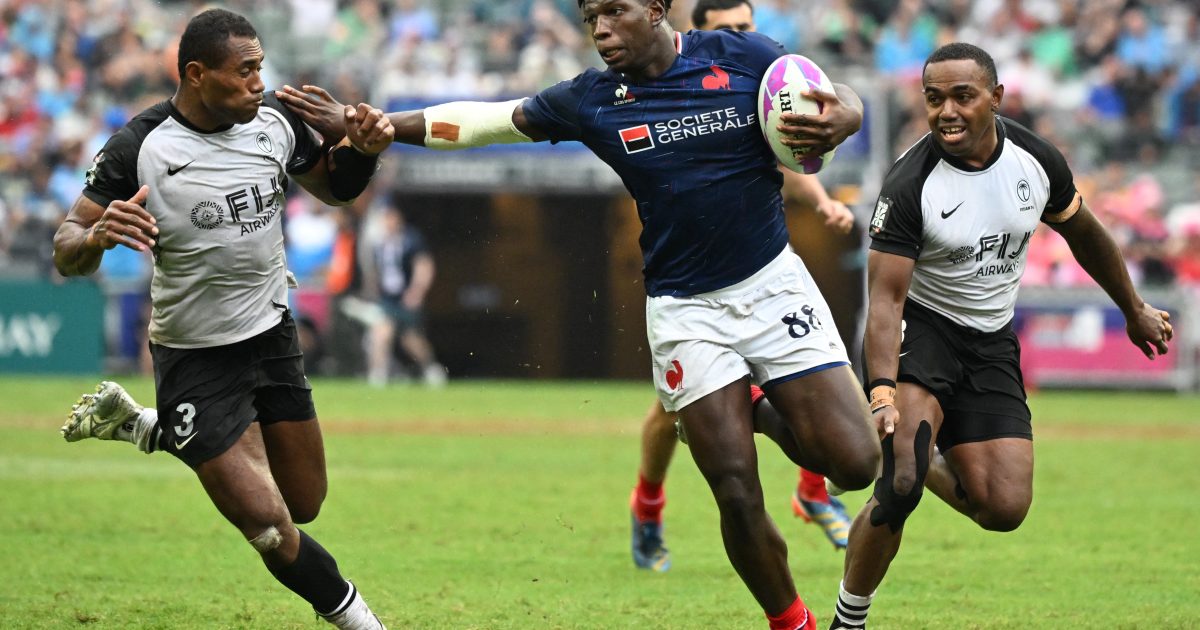France 7 : « Ce sport est une guerre psychologique »

Que l’équipe de France masculine de rugby à sept se classe devant la Nouvelle-Zélande et l’Afrique du Sud à deux tournois de la fin de la saison, qui l’aurait cru il y a encore quelques années ?
Certes les All Blacks Sevens ne brillent pas cette année par leur régularité et les Blitzboks n’ont jamais été aussi bas depuis que leur entraîneur de légende Neil Powell est parti il y a presque deux ans pour devenir le directeur du rugby des Sharks.
Mais quand même, ça ne retire en rien l’exploit qu’est en train de réaliser France 7 sur le circuit mondial. Alors que l’on disait que la saison 2022-2023 – marquée par trois médailles de bronze et une d’argent – était la meilleure de son histoire, la saison qui est sur le point de s’achever semble encore meilleure.
Le curseur a été déplacé
Comme l’an passé, la France pointe à la 4e place du classement général. Et là où c’est un exploit, c’est que les hommes de Jérôme Daret ont su changer de braquet en plein milieu d’une saison bien mal engagée. « On a bougé le curseur », confirme l’entraîneur.
Ce qui a changé notamment, c’est sur le plan de la discipline. Avant Hongkong, France 7 était la deuxième équipe la plus sanctionnée du circuit avec une moyenne de 4,3 pénalités par match et un total de 14 cartons jaunes depuis le début de la saison – plus que toute autre équipe.
A Hongkong, France 7 a fait preuve de maîtrise en ne concédant que deux cartons (Antoine Zeghdar contre les Fidji et Jordan Sapho contre l’Irlande).

Autre changement important : la conservation du ballon. Alors que France ne conservait que 16,7% de ses renvois, l’équipe est montée à 36,8% à Hongkong, soit la deuxième meilleure équipe en la matière (derrière les 47,4% des Fidji).
Un effort a aussi été fait sur les plaquages : 75% de réussite sur les 72 plaquages contre 70,4% de réussite en moyenne depuis le début de la saison.
Facteur X
La neuvième place à Dubaï (sur 12), la 8e place au Cap et la 6e place à Perth ne laissaient envisager pas une super saison, sachons le reconnaître.
C’est alors que le facteur X Antoine Dupont est entré en jeu pour la tournée en Amérique du Nord et les choses se sont débloquées : une médaille de bronze à Vancouver, une médaille d’or le week-end suivant à Los Angeles et une médaille d’argent un mois plus tard à Hongkong, temple du rugby à sept (et sans Dupont).
« Il est indéniable qu’il a apporté des choses solides mais l’équipe avait déjà prouvé qu’elle pouvait gagner », recentre le coach Jérôme Daret.
Après le tournoi de Los Angeles, France 7 avait bondi de la 7e à la 4e place au classement général ; aucune équipe n’avait encore réalisé une telle remontée.
« Ce sport est une guerre psychologique, alors ça fait toujours du bien. On se construit mieux sur des choses positives. Avoir trouvé l’or était quelque chose de très important pour nous et pour envoyer des signaux », estime Jérôme Daret.
« La France fait un peu plus peur et bouscule tout le monde. »
Il reste encore deux tournois : à Singapour du 3 au 5 mai, puis la Grande Finale à Madrid du 31 mai au 2 juin. « Ce sera une grande répétition des JO », promet le coach qui espère y remporter la toute première saison de son histoire. En attendant le tournoi olympique de Paris 2024.


